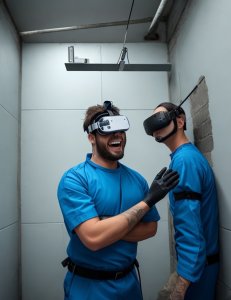In today’s ever-evolving world, law enforcement agencies are confronted with increasingly complex challenges that demand a versatile approach. To equip these agencies with the skills and knowledge required for effective public face safety, we advocate the integration of state-of-the-art virtual reality (VR) training programs.
Benefits of Virtual Reality in Law Enforcement Training:
- Realism and Immersion: Virtual reality creates highly immersive training environments that closely mirror real-life situations. Trainees can experience scenarios, from routine traffic stops to high-stress hostage situations. This realism enhances decision-making and situational awareness.
- Risk Reduction: Traditional training exercises often entail live simulations, which can be hazardous and costly. VR training eliminates these risks while providing an equally effective training experience, ultimately saving lives and resources.
- Cost Efficiency: Adopting VR training can lead to substantial cost savings for law enforcement agencies. By reducing the need for physical facilities, equipment, and ammunition, agencies can save significant funds, making efficient use of taxpayers’ money.
- Standardization:VR training ensures that all trainees receive consistent, standardized instruction. It eliminates variability in training experiences, guaranteeing that every student is well-prepared for real-world situations.
- Multi-Player System:Virtual reality training often includes a multi-player system, enabling trainees to collaborate with others from different locations. This feature is particularly valuable in international contexts, fostering cooperation and enhancing collective preparedness.
Impact on EU Commission Countries:
The adoption of virtual reality training by law enforcement agencies across all EU Commission countries can yield a significant positive impact. It enhances the effectiveness of individual agencies and promotes cross-border cooperation, which is vital in addressing modern transnational challenges.
Conclusion:
Virtual reality training for law enforcement agencies stands as a groundbreaking advancement in preparing officers for the complex and dynamic situations they encounter daily. The benefits extend beyond individual agencies, establishing a safer, more efficient, and cost-effective approach to law enforcement training. By embracing this technology, all EU Commission countries can strengthen their security forces, save resources, and contribute to a safer and more secure Europe.







